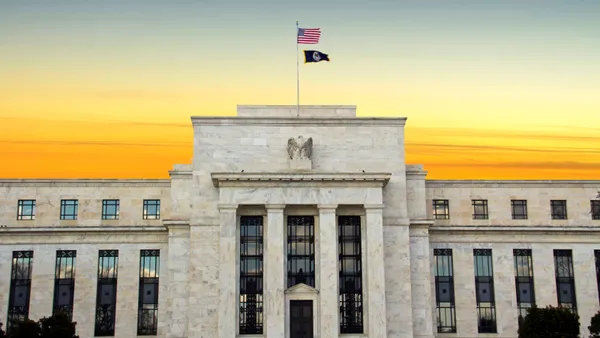Dive Brief:
- Wells Fargo and JPMorgan Chase drew customers' ire this weekend over perceived delays in the disbursement of a third round of stimulus payments, worth up to $1,400 per person.
- The IRS said Friday the payments would reach Americans over the next week. But fintech Current, known for making direct deposits available to customers in previous rounds of distributing stimulus checks, said it had started crediting user accounts shortly after 11 a.m. Friday. Fellow fintech Chime tweeted Friday afternoon it had made about $600 million available to 250,000 users.
- The disparity shows a pattern. Current passed 20,000 stimulus payments last April to customers days ahead of when traditional banks' users received them. Chime, meanwhile, reportedly used its own capital to fund 1,000 random customers' stimulus checks, weeks ahead of when the federal government was to issue the payments last April.
Dive Insight:
Government action on the third round of coronavirus-era stimulus checks has been fairly swift. Congress on Wednesday approved the $1.9 trillion relief package in which the payments are couched. President Joe Biden signed the bill Thursday. And Friday's IRS statement alerted consumers to a tool that tracks the status of their stimulus payments.
Even though the IRS has begun sending the payments, the official payment date is March 17 — a time frame with which Wells and JPMorgan aligned, to the chagrin of customers who've heard other financial institutions are distributing the money earlier.
The term "direct deposit" trended on Twitter over the weekend, with thousands of users expressing their frustration and speculating the banks are holding on to the money for a few days to accrue interest, or because a delay in payout may spur a spike in overdrafts.
Wells Fargo disputed that idea in a statement emailed to Bloomberg on Sunday.
"Wells Fargo is not holding the funds," said Jim Seitz, a spokesperson for the bank. "We know the importance of the stimulus funds to our customers, and we are providing the payments to our customers as soon as possible on the date the funds are available, based on IRS direction."
JPMorgan recommended users establish account alerts to let them know when the deposit posts to their account.
"We expect that electronic stimulus payments will be available in eligible Chase accounts as soon as Wednesday, March 17, 2021," the bank said in a statement posted to its website.
The Treasury Department said the stimulus is being rolled out in phases, meaning not everyone will receive the money at the same time. The IRS backed that up in a statement on its website.
"Some Americans may see the direct deposit payments as pending or as provisional payments in their accounts before the official payment date of March 17," the agency said.
Fintechs, meanwhile, trumpeted their success at making stimulus funds available immediately. "These payments will be available at traditional banks on 3/17 but Chime members already have access and more is on the way. No reasons to wait till St. Pattys Day, at Chime you're always lucky," Chime tweeted Friday.
Previous rounds of government stimulus have incited innovation from some lenders. Jill Castilla, CEO of Citizens Bank of Edmond in Oklahoma, worked with entrepreneur Mark Cuban last year to craft a payment advance program that allowed customers to overdraw their accounts while they waited for their stimulus checks to arrive.
"We ended up sharing the program with about 400 other banks," Castilla said.
Wells Fargo, for its part, told customers in a frequently-asked-questions segment of its website that branch and call center workers wouldn't have additional information on the status of individuals' payments.
"March 17 is the official payment date provided by the IRS when the funds are available, and customers who are eligible to receive a direct deposit of their stimulus payment may expect it as soon as the morning of March 17," the bank told The Hill.
Wells Fargo and JPMorgan both enacted temporary policies when the first stimulus payments were released last year to ensure customers with negative account balances get their full coronavirus stimulus checks. Some other institutions reportedly applied the stimulus check to negative balances, then passed the remainder on to consumers.












